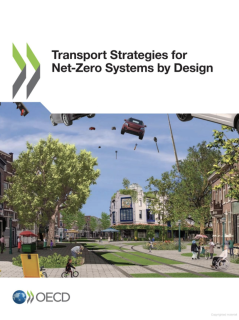
An important limitation for scaling up climate change mitigation is that climate action mostly focuses on incremental change in the systems that underpin today's modern economies and societies. In other words, climate action all too often aims at optimizing individual components within these systems rather than transforming the systems themselves, which are actually unsustainable by design.
This report applies the OECD well-being lens process to the transport sector, encouaring countries to focus climate action on delivering systems that - by design - improve well-being while requiring less energy and materials, and thus producing less emissions.
The report identifies three dynamics at the source of car dependency and high emissions - induced demand, urban sprawl, and the erosion of active and shared transport modes - and provides policy recommendations to reverse such dynamics and reduce emissions while improving well-being. Analysis also shows why the effectiveness and public acceptability of carbon pricing and policies incentivizing vehicle electrification can significantly increase after policy reprioritization towards systems redesign.
